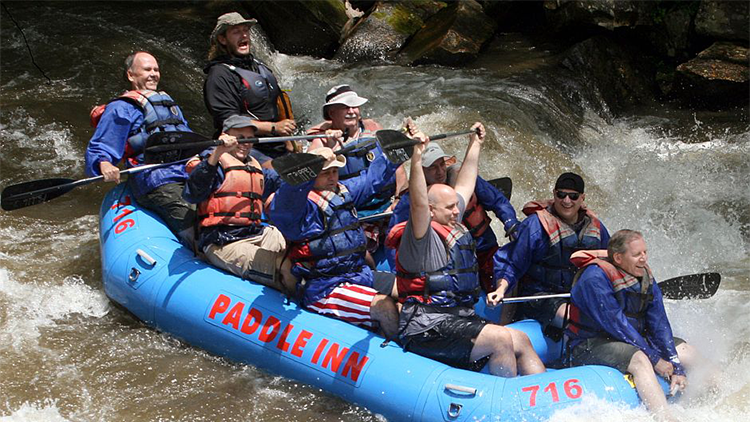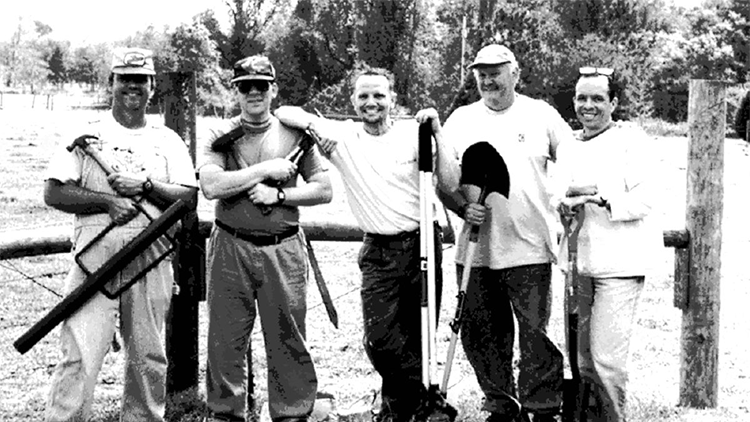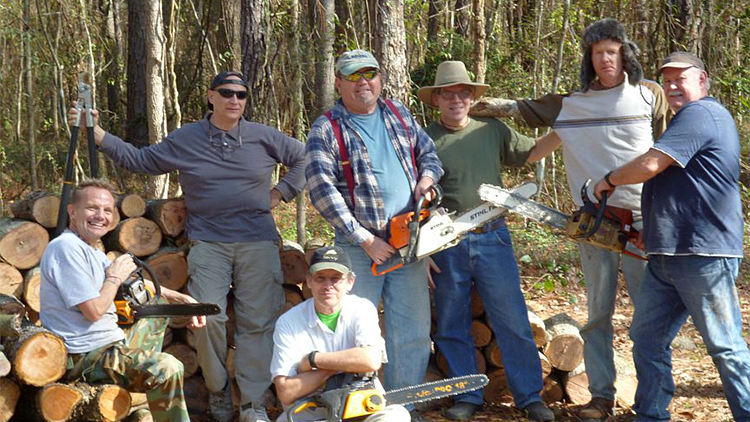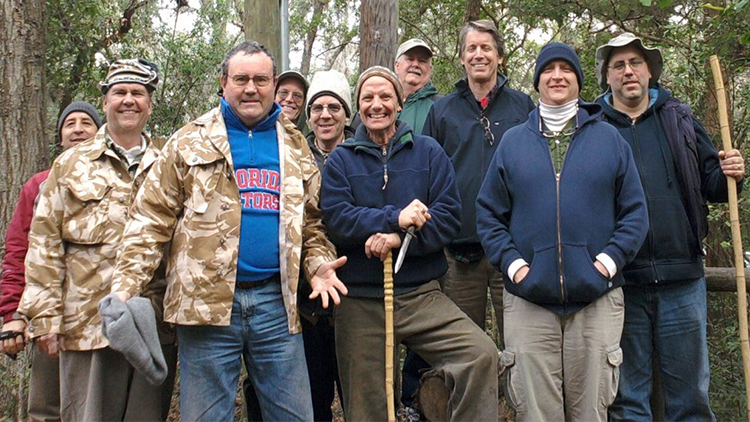Sadhu Sanga Men’s Group Creates Support, Lifelong Friendships
By Madhava Smullen | Apr 20, 2020

Note: Group photos in this article were taken prior to the COVID-19 Pandemic. The article also describes group activities which took place before Coronavirus. During the pandemic, the Sadhu Sanga Men’s Group meets virtually over Zoom.
A devotee men’s group started in Alachua, Florida in 1992 has offered both spiritual and practical support, as well as close friendships, for members over the past 28 years.
Several current members have been part of the group – named Sadhu Sanga Men’s Group – from the very beginning, while the rest joined between fifteen and twenty-five years ago. Starting when they were young men, the group of householder devotees (both Prabhupada disciples and grand disciples) now range from their mid-fifties to mid-seventies, having spent the better part of a lifetime together.
The group came into being when the late Svayamjata Das and his then-wife Titiksa Dasi moved to Alachua from California in the early 1990s and started a series of men’s and women’s support groups.
“Back then, the Alachua community was growing very fast,” says Kesihanta Das, a member of Sadhu Sanga since the beginning. “Devotees were coming from many different places and backgrounds. The groups – there were at least half a dozen men’s and half a dozen women’s groups – were intended to support each other in Krishna consciousness, family life and community life.”

Repairing cow-pasture fences at New Raman Reti, Alachua, Florida in the early 2000s (left to right) Stoka Krishna, Kesihanta, Chaturatma, Akincana Krishna, and former member Raghupati Pran
According to Kesihanta, the need for a men’s group, in particular, was due to the fact that “In American society at least, it seems that adult men don’t make friends as easily as women, and they don’t open themselves up, have conversations, and share things with each other as much. But men also have feelings, and need to have close friendships as adults.”
To facilitate this, the eleven members of the Sadhu Sanga Men’s Group follow a specific structure, based on “The Four Cs” — Commitment, Confidentiality, Communication, and Confrontation.
Members (called “sadhus”) make a commitment to meet once a week for at least eleven months out of the year; and to attend every meeting when they’re in town, unless there is an especially pressing engagement, in which case they must notify the group. They also make a personal commitment to be there for each other outside the meetings with emotional, financial or practical support when needed.
The group practices strict confidentiality, so that the sadhus can freely share what’s on their minds and inquire confidentially, two of Rupa Goswami’s six exchanges of love from the Nectar of Instruction.
Good communication is also prioritized, and healthy confrontation – a part of any relationship – is not avoided when it is important for the friendships in the group.
Meetings are held every week at a member’s home, with a different captain organizing them each month. During the Coronavirus pandemic, of course, meetings take place virtually over Zoom, with some modifications to the usual schedule.

Tree clearing at Chaturatma’s, Alachua, Florida (Left to right) Chaturatma, Tamraparni, Mathuresh (seated), Gosthabihari, Kesihanta, Radha Gopinatha, Akincana Krishna
Each meeting lasts two to three hours, and starts with a five or ten-minute kirtan during which members take turns leading. They then read from a spiritual book – the group is currently reading “Yamuna Devi: A Life of Unalloyed Devotion” – before each sadhu has a five-minute check-in, sharing something about how their week went.
“This could be anything from trying to fix your lawnmower engine to what happened at work, to some spiritual question you have,” Kesihanta says.
Processes come next. Derived from icebreakers in business meetings or seminars, these include quizzes with questions like “What was your childhood dream?”, fun games like Pictionary, and games the members have made up themselves such as quizzes on the Lord’s pastimes. Every meeting ends with prasadam.
In the summertime, the group meets at the home of a member who owns a pool, and plays an hour of water volley ball as part of their gathering for fun and exercise.
Meetings can dive deeper, too – if a member has a challenging life issue they would like the group to address, it can be put on the agenda in advance, and the others take extra time to help him through it.
“We’ve had devotees who have gone through health crises, mental health issues, divorces, and spiritual crises,” Kesihanta says. “It’s all about helping each other.”

Camping at Fort Clinch State Park, Amelia Island, Florida (left to right) Govinda Priya, Stoka Krishna, Gosthabihari, Kalakantha, Kesihanta, Chaturatma, Akincana Krishna, Mathuresh, Tamraparni, Madhava
Members support not just each other, but also their local devotee community, in many ways. Sadhu Sanga has mentored two next generation men’s groups, helping them to get started – the Vaishnava Gentlemen’s Group, which has been running for about a decade; and the newer Gainesville Men’s Group, affiliated with the Krishna House.
Sadhu Sanga gets together to do seva, or service, at the ISKCON New Raman Reti farm several times a year, doing cleaning marathons, painting Tulasi Devi’s house, and repairing or building cow pasture fences at the Holy Cow Goshala, sometimes with the other local men’s groups.
“The last time, we built a fence with all three men’s groups and their kids,” says Kesihanta. “So it was a multigenerational project. We’ve also done Vaishnava seva for each other, like clearing trees on a member’s property. And in our early days in the ‘90s, we built a small Rathayatra cart which was used in the Gainesville Homecoming Parade for some years.”
Members each pay dues of $10 a month, which are also used to help the community. Every year, several hundred dollars go towards sponsoring the prasadam feast after the Gainesville Rathayatra at the University of Florida’s homecoming parade. The group has also donated to help young devotees go on ISKCON Youth Ministry bus tours, devotees in need of financial assistance, and some of their own members going through hard times.
Dues are also used for sadhus to enjoy recreational activities together, including an annual camping trip in Florida or a nearby state, and a float and picnic down the local Ichetucknee River.
The group also yielded The Blind Uncle Band, a satirical combo that that put on humorous concerts at the ISKCON Alachua temple’s Thanskgiving festival every year to the delight of devotees. The band poked fun at life in Alachua with retooled songs from the ‘60s, such as Born to Wear White, a militant grihasta song, Come on Let Me Light Your Fire, an advertisement for yajna services, New Clicker, about chanting japa on clickers, and “I Want to Live in Alachua,” based on the song “America” from Westside Story.
Although the band’s last official show was in 2005, there was a revival show several years ago, and Kesihanta jokes, “Recently there’s been a resurgence in banjo playing amongst our members, so we may come out with a new Blind Uncle banjo band – we’ll see!”
Sadhu Sanga Men’s Group has strengthened and deepened friendships that already existed before joining, and created close friendships among those who met through it. It has served its community. It has formed an incredible practical support system – members can call each other for help whenever they have a problem, drawing from a wide range of talents and knowledge. And it has provided essential spiritual support.
“Householders are engaged in household affairs, so they don’t necessarily get to associate all the time with devotees,” Kesihanta says. “Especially in a community like Alachua, where everyone lives on their own properties and has their own family life and work life, it’s hard to get association. So for some members, this is the only time they get regular devotee association, every week – a little kirtan, reading, prasadam, and exchanging.”
“The group has given me regulated association with peers and mentors, which I have found extremely helpful for my spiritual life,” says Kalakantha Das, another member. “Every time we meet, and I remember that this has been going on for more than twenty-five years, mostly with the same group of people, that’s just mind-boggling to me. It’s amazing.”
A women’s group has also been running for about a decade in Alachua, offering similar connection and support for ladies.
Sadhu Sanga Men’s Group is willing to help mentor any devotee men who want to start a new group over the phone or Internet, or in person locally when COVID-19 restrictions eventually lift. For more information, contact jeevjago@gmail.com.















